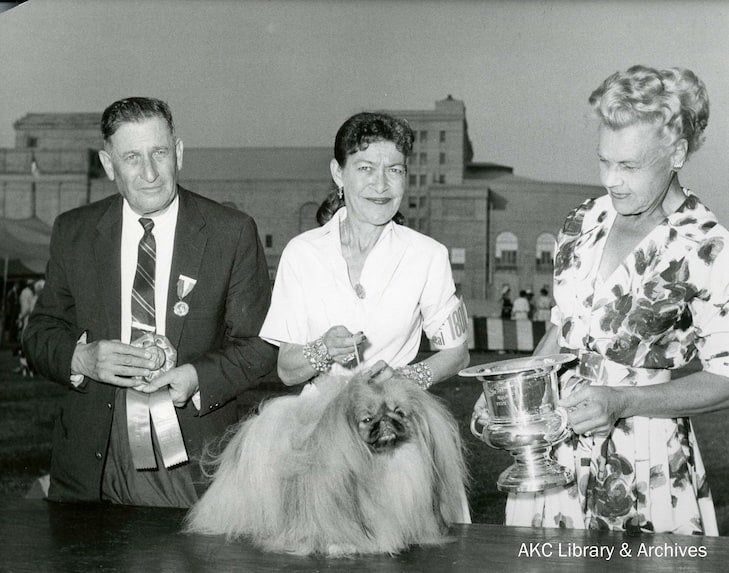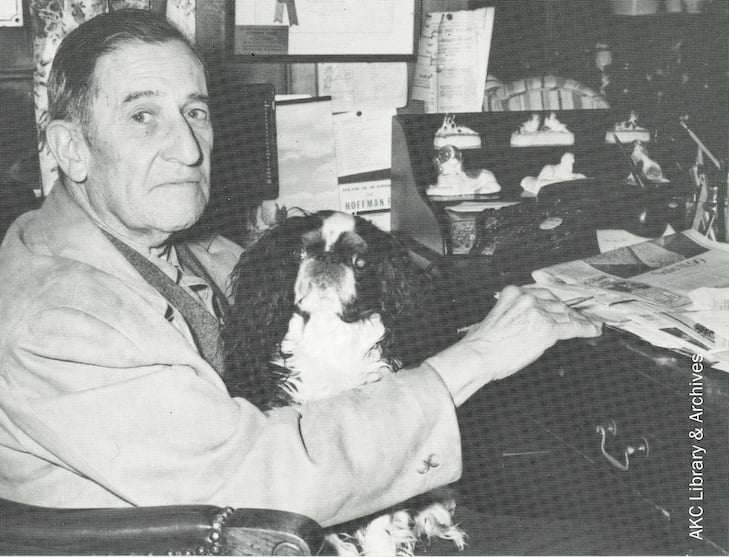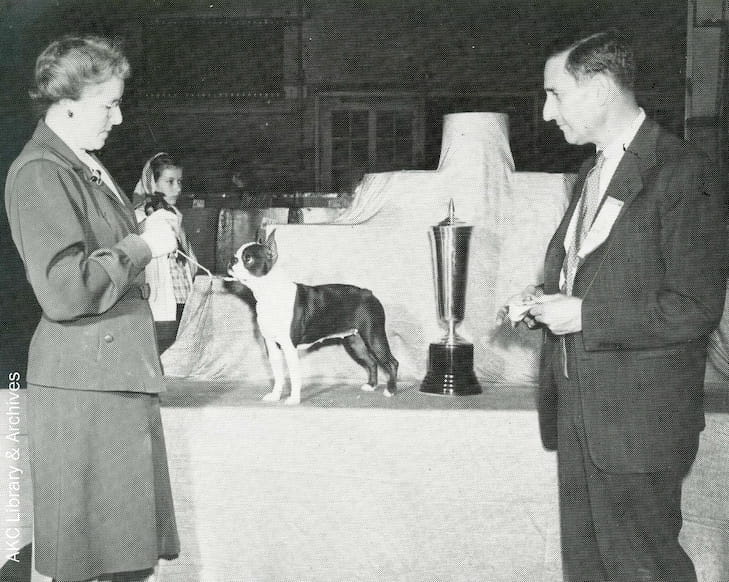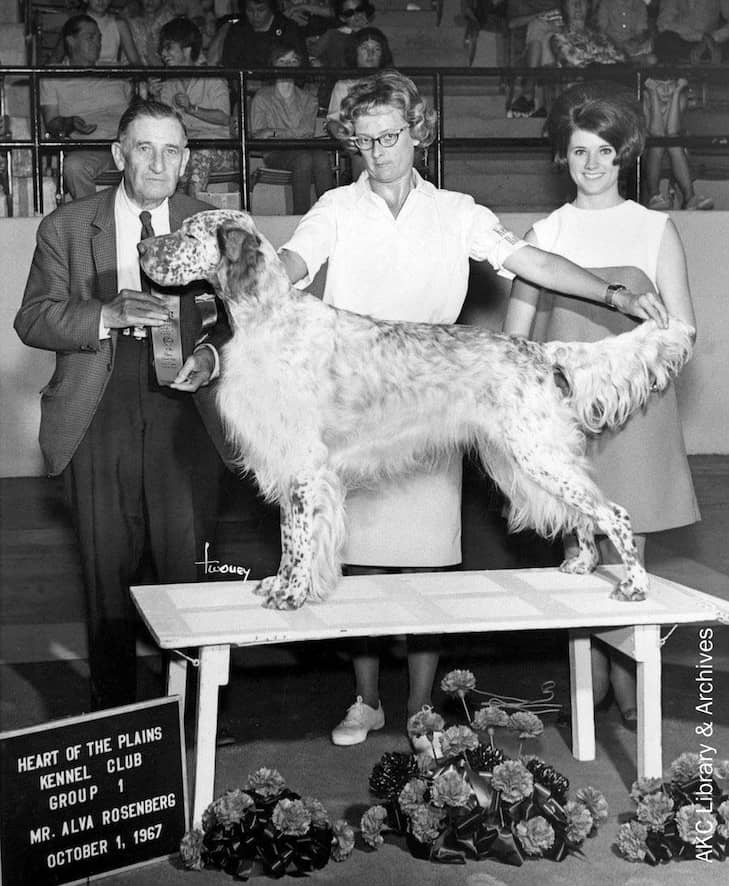
Every sport has had its great ones. And the sport of dogs had Alva Rosenberg.
Excruciatingly modest and correspondingly revered, Alva Rosenberg was, and arguably still is, the most respected judge in the history of dog shows in America, and perhaps the world. Even the British, who invented the conformation game and have no tendency to downplay their primacy in it, concurred.
“Would that we had judges in England like this man,” an English dog magazine reportedly opined about Rosenberg, whose 1973 obituary in The New York Times described him as “the dean of American dog show judges.”
A Life Devoted To Dogs
Born in 1892, Rosenberg was quite literally a Victorian gentleman, judging his first entry of Pomeranians at 17 years old. Back then, William Howard Taft was president, and women still could not vote. Dogs could also earn their championships without ever defeating another dog of their own breed.
In a judging career that spanned seven decades and all the breeds recognized by the American Kennel Club, Rosenberg adjudicated at more than 1,000 dog shows. He traveled to many by train since, as a born-and-bred Brooklynite, he never learned to drive. Among his innumerable accomplishments, Rosenberg judged at the iconic Westminster Kennel Club show a whopping 21 times, including all of the groups. Additionally, he awarded Best in Show at England’s prestigious Windsor Championship Dog Show.

Soft-spoken and stoop-shouldered in his later years, Rosenberg went to his first dog show, Westminster, as an 8-year-old. His mother promised to take him home once he got tired. Instead, she was hard-pressed to get him to leave at day’s end. The youngest of 11 children, Rosenberg continued to be smitten with furry four-leggers throughout his youth. He once returned from the circus with a Schipperke puppy that had had difficulty keeping up with the big top’s troupe of performing Poodles. The diminutive black dog joined a Borzoi and several English Toy Spaniels residing in Rosenberg’s bedroom.
Those toy dogs likely came from dentist Edward Berendsohn and his wife, both judges, and breeders of Bulldogs and Japanese Chin, as well. These mentors, in turn, introduced Rosenberg to Dr. John E. DeMund, later president of the American Kennel Club, who gifted the 16-year-old with Novosti the Borzoi.
Chronicler Of Canines (& China)
That champion Russian Wolfhound was one of the dogs Rosenberg dutifully logged into his kennel record. The fragile book, about the size of a large iPhone, now resides in the AKC Library. Rosenberg’s spidery handwriting recorded the pedigrees and prizes of his dogs, and the new owners of his puppies, including Boston Terriers, which he bred and showed under the Ravenroyd prefix.
“Alva Rosenberg was a true connoisseur of purebred dogs,” says longtime AKC judge Elliott Weiss. “He had a tremendous amount of passion for what he did.”
Weiss often visited Rosenberg at the Wilton, Connecticut, antiques store where he was found in between dog shows. He always formally dressed in a shirt and tie. In addition to being a sought-after arbiter of dogs, Rosenberg was also an antiques expert, with a particular interest in fine Wedgwood china. Though the not-so-trivial issue of animation separates them, dogs and antiques have one overriding similarity. In both, form follows function, and having an eye for each requires the ability to see symmetry, balance, and quality.
In a 1980 interview, New York Times reporter Walter Fletcher noted that Rosenberg had the same knack for recalling the provenance of the antiques he sold as he did of the dogs he judged.
“He took me through his shop and held every piece with such love and he could tell you a story about each item,” Fletcher recalled.
Distinctive Discernment
Descriptions of Alva Rosenberg invariably mention his uncanny ability to recall almost any dog he had touched. He was known for oftentimes reciting pedigrees and win records to boot.
In a 2011 article, Poodle breeder Luis Aizcorbe described showing a promising young dog to Rosenberg, only to leave the ring without a ribbon. A year and a half later, Rosenberg awarded the same dog, now a champion, a Group 1st.
“After the judging, Alva informed us, unsolicited, that he had previously left the dog unplaced well over a year before because the rubber bands holding the dog’s topknot were too tight, giving him an undesirable expression for a Poodle,” Aizcorbe explained.
Fast-forward to a year later, when that same dog earned a hotly contested Best in Show under Rosenberg.
“The last thing he did before pointing,” Aizcorbe recalled, “was to re-check the dog’s expression.”

Longtime judge and Cocker Spaniel breeder Terry Stacy of Chapel Hill, North Carolina, says part of Alva Rosenberg’s appeal was his absolute sincerity, coupled with true humility.
“He told me once, ‘There are only seven or eight breeds that I think I know so well that I can judge them inside out,'” Stacy says. “But everybody thought he was great on their own breed.”
Praising Purpose-Bred Pups
“I interviewed him on several occasions. Once, he said, ‘Please don’t make a hero out of me. I’ve had interviews before and they all say I am a great man and I’m really not,'” Fletcher once wrote of Alva Rosenberg. Recalling their conversation, Fletcher said the judge was stroking one of the old stray cats he had adopted, which was curled contentedly in his lap.
The lessons Rosenberg taught the young judges and breeders who sought him out still resonate today.
“He said never, ever judge on faults,” Weiss says. “Learn to appreciate the beauty and the type, and that should come first. If you look at a class of dogs, you know what dog you should like before putting your hands on it.”
Weiss adds that Rosenberg urged him to go beyond the breed standard to fully understand the dogs he was judging. Weiss remembers Rosenberg talking to him about English Cocker Spaniels, and how the sloping toplines and racy outlines often seen in the ring were decidedly incorrect.
“He said, always remember, this is not an Irish Setter. This is made to go through thick brush. It must have strength before anything,” Weiss recalls.
Similarly, there was a lesson on the difference between Lakeland and Welsh Terriers, which to the untrained eye might look quite similar.
“Alva affirmed that the Lakeland was bred to go into rock crevices in the mines,” Weiss continues. “You don’t want a great big ribcage like on a Welsh for that reason. Otherwise, they couldn’t carry out their function.”
An Indisputable Icon
When asked to name the greatest thrill he had experienced in the sport, Rosenberg’s answer was swift and sure.
“Finding a good dog and starting him or her on a career,” Rosenberg replied. “I’ve never hesitated to take a good one out of the classes and put it over champions. It’s been my good fortune to have given some great dogs their first Best in Show.”

Over time, Rosenberg came to embody all good things about the sport of dogs and nearly none of the negatives. Reserved, yet eager to share his knowledge with those who sought him out, unfailingly polite but also unflinchingly honest, Rosenberg had a gentle hand on a dog, an almost flawless memory and a sponge-like mind. Perhaps most of all, he inspired breeders and handlers to produce and present dogs worthy of his admiration.
Alva Rosenberg, that great authority on type and quality in American show dogs, has been gone for almost a half-century. But among those who knew him over lifetimes in the sport, the superlatives still fly.
Former handler and iconic Basenji breeder Damara Bolte has just one word for Alva Rosenberg: indisputable.
“Everybody liked and revered him almost,” she muses. “They don’t make that kind much anymore.”

